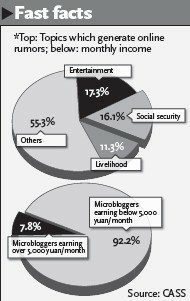Microbloggers defy categorization

Source: CASS
Most Chinese microbloggers are young, have a poor educational background and are in a low-income bracket, according to the Annual Report on Development of New Media in China (2013) released on Tuesday by the Chinese Academy of Social Sciences (CASS).
Out of a total 300 million microbloggers in 2012, student users number nearly 94 million, and 74.88 percent of users only have a high school education, according to the report, dubbed as the Blue Book of new media in China.
Low- or no-income groups constitute the majority, with 92.2 percent earning less than 5,000 yuan ($813) per month. Of these, around 91 million had no-income, meaning they are mostly students.
Many Web users were annoyed at being characterized as poor, young and not highly educated.
"Five thousand yuan per month can't be called low-income in small Chinese cities. The concept of low-income needs to be redefined," a Web user said on Sina Weibo.
"According to this, students are classified as no-income. But how can they be classified like that since they do not have a job yet?" wrote another.
"All the statistics are calculated by a mathematical formula and are highly credible," said Liu Pengfei, chief analyst of the public opinion research institution for the website of the People's Daily, whose team is in charge of writing one of the microblog chapters of the report. He told the Global Times Wednesday that being of low-income is a relative concept, as 5,000 yuan per month is not low for many places in China.
The report revealed that the Internet has played a more important role in fighting against corruption in recent years, with the corruption cases revealed online outnumbering those revealed by traditional media.
From 2010 to 2012, 156 corruption cases were exposed online, double the number of traditional media. Especially in 2012, microblogs played an impressive role in fighting corruption, the Beijing Evening News reported Wednesday.
However, the report also said that many Web users abuse their freedom of speech online and release untrue information. These rumors can easily trigger public concern, but can lead to a waste of public resources, especially when it comes to corruption.
According to the report, among 100 hot topics online from January 2012 to January 2013, one-third of these topics will attract rumor-mongering.
The top three categories of rumors in 2012 were entertainment, social security and those to do with livelihood and welfare, respectively taking up 17.3, 16.1 and 11.3 percent.
"But the major causes (of rumors spreading) are information opacity, quoting out of context and being started on purpose," said Liu, adding it is hard to stop rumors due to the mass of microbloggers.
Song Jianwu, dean of the China University of Political Science and Law, said there are so many ways of interpreting an event that he is not surprised about the number of rumors online.
"Only those who start rumors on purpose and cause damage to society should be punished," he noted.